Displaying items by tag: Peter Malone's Movie Reviews
Mean Girls/ 2023
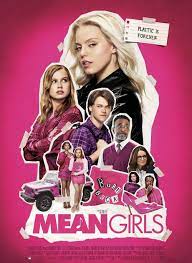
MEAN GIRLS
US, 2024, 111 minutes, Colour.
Angourie Rice, Renee Rapp, Auli'i Cravalho, Jaquel Spivey, Avantika, Bebe Wood, Christopher Briney, Jenna Fischer, Busy Phillips, Tina Fey, Tim Meadows, Lindsay Lohan, Jon Hamm, Ashley Park.
Directed by Samantha Jayne, Arturo Perez Jr.
The original Mean Girls was an instant success in 2004. It was based on a popular novel, Queen Bees and Wannabes, 2002, by Rosalind Wiseman. Audiences, especially teenage audiences, responded immediately. And the screenplay was written by Saturday Night Live writer and sharply ironic comedian, Tina Fey. It was a star vehicle for Lindsay Lohan, contributed to the career of Rachel McAdams and was a starting point for Amanda Seyfried and Lacey Chabert.
Mean Girls was successfully brought to the Broadway theatre as a musical in 2013. Now, 20 years after the original film, here is the screen version of the musical. Fey and Meadows reprise their 2004 roles – Ms Norbury and Mr Duvall. This time there are some guest cameos, including Hamm as coach, Fischer is the heroine’s mother, Phillips is the mother of the Queen Bee Regina George (Rapp), and, in the final Mathletes’ competition, Lohan is the compere.
Audiences who enjoy seeing the film version of a Broadway musical will go along. However, while it is exuberant, its 2020s, social media, Tik-Tok vibe, as well as franker and coarser language, the question would be how much it would really appeal to the, say, over 30s (or even the over 25s).
It is almost two hours spent in the company of teenagers that many in the audience might want to avoid in real-life, and on the screen.
While the plot is the same, there was something about the meanness in the original film that caught audience attention, dramatic ploys, one-liners, sometimes an almost admiration for the clever meanness. This time, it just seems so often meanly mean.
Australia’s Rice is the young student from Kenya, Cady, eager to go to high school in the US. She is pleasant in the role, at first the victim, then absorbing the meanness of the elitist Plastics clique in the school. On the other hand, Rapp is dominating – completely believably mean and gets everyone’s attention. There are some clever performances from the supporting cast.
Briney (The Summer I Turned Pretty, Daliland) is the charming boyfriend, linking with Cady in Fey’s calculus classes.
There is some truth in an IMDb blog comment, ‘It’s like watching several music videos with a modern mean girls in between’.
A finir del tunel/ At the End of the Tunnel
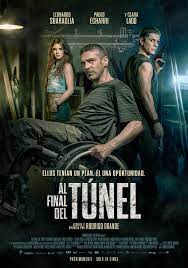
AT THE END OF THE TUNNEL/ A FINIR DEL TUNEL
Spain/Argentina, 2016, 120 minutes, Colour.
Leonardo Sbaraglia, Pablo Echarri, Clara Lago, Federico Luppi.
Directed by Roderigo Grande.
Tunnel of the title is a complex range of tunnels under a building, aiming towards bank falls for a robbery. There are many digging scenes, as expected.
However, the plot is rather different insofar as the focus is on a paraplegic man who lives in the building above the tunnels. He is a loner, an expert on surveillance, and is able to film and record the work of the robbers and their conversations.
A further complication is his advertising space for a lodger and a dancer from a local club coming with her daughter (who hasn’t spoken for two years) and taking up residence. As a drama with the interaction between the dancer and the paraplegic, the film works quite well. Also the issue of the daughter who bonds with the paraplegics dog and even talks to him (and this is recorded).
However, the dancer is the girlfriend of the of the head of the robbery team. And the team is governed by a corrupt policeman. Which all builds up to the intervention to thwart the robbery, taking of money and significant documents, and confrontations all round.
- A bank robbery thriller with a difference? Tunnelling, Joaquin and his paraplegic, Berta and her daughter?
- The confined setting, the opening with the street, the bank, the action in the interiors in Joaquin’s house, the basement, the tunnels? The finale in the streets? The musical score?
- The setting up of the robbery, the group digging, their relationships, the control of Guttman, the revelation of his police connections, his motivation, the documents, the robbers and their experience, money? The detail of the digging, the maps, mistakes, the using of explosives? Cautions, the roof? The interactions while digging?
- Joaquin, paraplegic, his background, loner, his basement, computers and surveillance, his hearing the robbers, the cameras, the audio? His following the digging? The effect on him, motivations, money issues?
- The advertisement, Berta and Betty, Berta and her background, dancer, Betty not talking for two years, moving in, dominating, Joaquin and his response? The discussions with Bert, his past, relationships? Her past, boyfriend?
- Joaquin, realising she was a plant, treatment of her? Her taking turns, injections? Berta and her daughter, her concern about her not speaking? Betty, at home in the house, the attraction towards the dog, bonding with him, talking with him and Joaquin recording this, Berta’s reaction?
- The progress of the digging, the deadlines, the decisions, Guttman and his control?
- Betty, going down, taking the watch? Joaquin bringing her up again? Reassurance?
- Joaquin, going down, taking the money, the documents? Hiding?
- The water, flooding the tunnel, the drowning of the robber, her asking to be saved, Joaquin putting on the cover? The others, the empty boxes? The increasing flood, Joaquin’s basement?
- The authorities arriving, Guttman and his presence, curbing the flood, the police interrogating Joaquin, the search? Guttman arriving, giving his phone number? The robbers arriving, the confrontations, guns, wanting the truth? Joaquin and his stories, Betty appearing, finding Bert?
- The technique of Joaquin setting them against each other, the target, accusing it of collusion, betrayal, the producing of the watch? The shootings? The leader, his being shot? Guttman, the hold over each other, Joaquin and the documents? Giving Guttman the bag, the crash, the body in the car trunk, the explosion?
- The finale, the three together, the money, a future?
Sleeping Murder/ 1985
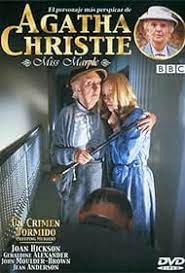
SLEEPING MURDER
UK, 1987, 102 minutes, Colour.
Joan Hickson, Geraldine Alexander, John Moulder-Brown, Frederick Treves, Jean Anderson, Terrence Hardiman, John Bennett, Jack Watson.
Directed by John Davies.
Agatha Christie’s novels were enormously popular in the 20th century, many film and television series made. And, they continue into the 21st-century, new Poirot films, continued streaming screening of Miss Marple stories and those of Poirot.
While Angela Lansbury and Margaret Rutherford did portray Miss Marple, the main screen presentations were by Joan Hickson, Geraldine McEwan, Julia Mackenzie. It is interesting that the stories with the latter two Miss Marples was somewhat updated, the films with Joan Hickson had the post-war atmosphere, the late 1940s, the 1950s, life in the village, costumes and decor, vehicles, religious observance, traditional values…
This Miss Marple story is somewhat different. Usually there is a police Inspector who dislikes the interference of Miss Marple but then has to work with her to solve the crime. In this film, the crime happened 20 years earlier, the disappearance of a young woman, allegedly going off with a male and not heard of afterwards. As a young couple, who have spent some time in New Zealand, drive along a country road, the wife sees a mansion and feels that it is just right for them. Which leads to some sense of déjà vu, re-experiencing some horror from the past.
As the mystery unfolds, the couple do the detective work themselves along with Miss Marple. There are several possibilities for murder, three men in the village who are investigated, and the half brother of the disappeared woman, the local doctor. Then, just as a witness is to help solve the case, she is murdered and, at last, the police do intervene.
It is interesting that in this particular story, the murderer is in plain sight.
- The popularity of Agatha stories? Miss Marple? The various actresses? Joan Hickson?
- The Joan Hickson movies, closer to the novels, the post-war settings, the English village, costumes and decor,, manners and proprieties? The musical score?
- The title, advice about the past, let sleeping dogs and murders lie? The dangers of uncovering the past?
- Miss Marple, the connection with her novelist nephew, his friends and their house? The reputation? Investigations, questions, going to shops, getting information? Confidante of the couple?
- A different Miss Marple story, the couple doing the investigations, her help, police arriving only after the murder towards the end?
- Giles and Gwenda, newly married, New Zealand, her background, India, gradual revelation of time in England? The secrecy about events and her father? Driving, her seeing the house, attracted, the tour with the agent, a scream at the top of the stairs? Foreboding? Redecorating, wanting the door and later discovering it was there, wanting steps and discovering the previous steps? The wallpaper, the flower patterns? Her becoming edgy, the invitation to London?
- Miss Marple, her nephew, his critical wife, going to the theatre, The Duchess of Malfi, Gwenda screaming, the words, the later repeating? The embarrassment, her worrying whether she was going mad?
- The advertisement for information, the doctor, his invitation, half brother to the missing woman, his being a doctor in the town, clients, many years, his visits, the letters from Helen, loss of contact? His benign interest and help?
- The uncovering of the real situation, Gwenda, her father in India, widowed, the voyage home, the encounter with Helen, marrying her, a year, suspicious behaviour, the story of her running off with someone, disappearing? The effect on the father, mental deterioration, institution, suicide? The visit to the institution to find out more?
- The men friends, the lawyer in the town, engagement, his being in India, the break off, the return, working in the town for 20 years? Morning tea with his mother, her views on Helen?
- The salesman, criticisms of him as loud, tracking him down, the couple pretending to hire a bus, the discussions about Helen, his being sorry for her, his flashy car and the reports of flashy cars?
- The Colonell and his wife, in Northumberland, the visit, the wife suspicions, Gwenda going back for the hearing, the conversation with the Colonel and hearing the truth?
- The servants, Miss Marple in the interviews, the flashbacks to what happened on the night, the maid at the pictures, her covering, Helen’s voice and not being afraid?
- The maid, her husband, seeing the ad, writing the letter to the doctor, coming to give testimony, her motivations, some money? In the fields, strangled?
- Help of the gardener, his memories of the past?
- Waiting for the maid, Giles and Gwenda and the doctor, her being discovered murdered, the police inspector?
- Miss Marple, her theories, the writing on the notes and checking out the authenticity, talking with the servants? Calling the inspector aside, the plan?
- The mysterious arrival, the threat to Gwenda, the hose, the doctor and his unmasking? His motivations, possessiveness, controlling Helen, the story of the tennis net cut, her foot injury, the reputation of the other men coming from the doctor, also the story is about her father, his actually fostering the delusions of the father?
- Satisfactory murder mystery, the past, detection and investigation, unmasking?
Amish Stud: The Eli Weaver Story
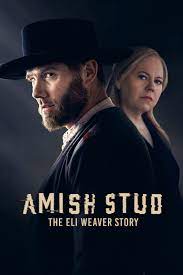
AMISH STUD: THE ELI WEAVER STORY
US, 2023, 85 minutes, Colour.
Luke MacFarlane, Kirsten Bangsness, Miranda MacDougall, Brent Stait, Mark Krisko, Claire Filipow, Karolina Cubatt.
Directed by Stacey N..Harding.
There is a certain curiosity when the film has Amish in its title. Memories of Peter Weir’s classic, Witness.
However, this is a different kind of story. And it is based on actual events and characters.
The title indicates the theme of the film. It was made for television, a Hallmark production, the company noted for its very popular entertainments for a wide television audience. And this is the case with the treatment here.
Luke MacFarlane (Bros) plays Eli Weaver, brought up in the Amish community, rebellious attitudes, moving out and experiencing a freer life, drinking, gambling, relationships with women. However, he returns to the community, asking for forgiveness and reconciliation. And he is accepted, marries a young woman who has been long infatuated with him, has children, but it is an unhappy marriage, he making sexual demands on her that seem not in keeping with Amish teaching, setting up a business with assistance from outsiders, keeping a mobile phone, keeping up contacts.
Early in the film, it is established that she has been killed. He is the main suspect but he has an alibi, out fishing at the time with a friend. When the police want to investigate and send detectives, the Amish leadership close up, stating that they want to solve the issues within the community.
There are flashbacks to the life of the family, the hardships of the wife, the brutality of Eli Weaver, his lies, his double standards.
The sister of the dead woman is suspicious, voices her suspicions, searches for evidence, eventually finding a diary that a psychiatrist had advised the woman to keep. In the meantime, Eli Weaver makes contact with the women with whom he had liaisons, some defending him, some remembering the past. Most of them had supplied him with money. However, the key woman is his Sec at his company, infatuated with him, married with a rather placid husband at home, flattered by Weaver’s attentions, she believes he is in love with her and goes along with a plan to murder his wife, doing online searches for poisons and ways of shooting, his giving her a rifle, leaving home, going to the house, killing his wife.
She is arrested, not helped by Weaver, in court, found guilty, an outburst against him. He then is tried for complicity, is sentenced to jail, continues to exercise his charm in prison.
The factual information at the end of the film indicates that he is due for parole in 2024.
Bump in the Night
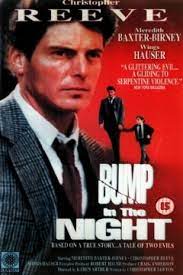
BUMP IN THE NIGHT
US, 1991, 93 minutes, Colour.
Meredith Baxter-Birney, Christopher Reeve, Wings Hauser, Corey Carrier, Richard Bradford, Geraldine Fitzgerald, Shirley Knight, Terrence Mann, Richard Joseph Paul, and to me.
Directed by Karen Arthur.
A strange, unexplained title.
However, this is a 1991 American television movie that is still worth noting.
Basically, it is the story of an abduction of a child, the anxiety of the parents, their participation, with the police, to find the child. The family story is complicated because of the careers of the parents, she, played by Meredith Baxter-Bernie, a successful investigative journalist and Colin writer who has taken to drinking, unreliable, especially with her son, and the father, a successful novelist, played by Wings Hauser.
There is a sympathetic presentation of the police and the investigators, led by Richard Bradford, professional, having to react to the anger of the mother, learns to understand the pressures on the father.
However, the theme that makes this television movie significant, especially in the early 1990s, is that the abductor of the little boy is a paedophile. There had not been many films about paedophiles to this point, Short Eyes with Bruce Davison, a prison film, an example.
What is very telling for this film is that the paedophile is played by Christopher Reeve, a very nuanced performance, taking away from his iconic Superman performances. He plays a literature Prof, colour of the community, discovered to be a paedophile, imprisoned, model prisoner, early release, but in no way cured or rehabilitated. He is in league with the woman associated with the pornographer, she sending him a photo, he paying her $1000, setting up a meeting with the boy on the pretence that the boy was meeting his father.
What is significant for those who want to understand something of a paedophile is the way in which, often subtly, Christopher Reeve plays his role, words spoken, sharing stories, the mentality of the child, touching, moods, the techniques of grooming.
There is an excellent supporting cast, veteran Geraldine Fitzgerald in her last role, Shirley Knight is an alcoholic friend, Terrence Mann as the pornographer.
At the same time the Dutch film, For a Lost, a nonjudgemental portrait of a relationship between an American soldier and a 12-year-old boy, was released, the film that with current understanding of age of consent, legislation about underage sexual relationships, could not be made in the same way today.
- A telemovie of the 1990s? Issues?
- The New York setting, filmed in Pittsburgh, American cities, apartments, police precincts, the streets, atmosphere? The musical score?
- The meaning of the title?
- The initial focus on Jonathan and Martha, ready for school, another drunk, sleep, contact with his father, going to the old lady who was minding his cat, going to the restaurant to wait? School principal, friend of Martha, concern, phone calls, the teacher referring to Martha is drunk, interrogating the little girl? Visiting the old lady with the cats, her information, the later visit and information?
- The tension between husband and wife, her past career as an investigative journalist, success, column? His successes and novelist? The separation? Her drinking? The refusal to admit it? Her irrational behaviour throughout the search, outburst, anger, drinking, the need for a drink? The treatment of people, relegating them? Her attitudes towards Patrick, arguments, anger?
- The introduction to Lawrence Buller, Cheryl the phone call, the photo, the rendezvous, the restaurant, Laurence introducing himself, talking about his father? The film showing something of the psychology and behaviour of the paedophile, the link, the contacts, with child pornography, charm, the mentality of a child and an adult, conversation, trust, sharing stories, the poem, the child trusting? Friendship? The experience of the zoo? Christopher Reeve and his performance, indicating the paedophile, touch, words, persuasive, trust? Techniques of grooming? Knowing how to respond? The rendezvous at the apartment? Pretending about his father to Jonathan? At the apartment, waiting for his father, the photography equipment, Laurence having an answer to everything? Time progressing, Laurence and his moods, angry, aggressive torts Jonathan? Locking the doors? Jonathan, the escape, his ingenuity, going to the attic, hiding, spending the night? Laurence and his frustrations? No food, going out, Jonathan breaking the glass in the window, Laurence noting it? The arguments, cajoling, the ultimate threat of the fire, setting it, getting out of hand?
- Cheryl, the dance company, Nicola 90s and the pornography, getting the photo from the photographer, contacting Lawrence, $1000, the apartment and rendezvous? Nickel ideas, confronting Cheryl, the police, killing Cheryl, searching for the information, going to the apartment, confronting Lawrence, bashing him, Laurence killing him? The police arriving, Laurence killing himself?
- The search for Jonathan, the clues, Martha and her not drinking, moods, aggression, friendship with Katie, sharing the drinking, Katie denying her alcoholism, the sketch of the face, made available, a couple recognising Laurence and telling the police?
- Patrick, his arrival, the tension with Katie, tension with the police, the search?
- Sgt Mooney and his assistant, taking the case seriously, the school, the outbursts, confronting each parent, moving sympathies, memories of Martha and her column? The assistant, actively involved, suggestions? The identification with Laurence Miller, Mooney and his telling of the story of Laurence, University lecturer, pillar of the society, accusations, jail, model prisoner, release? Yet his preying again?
- Martha, the photos, the numberplates, contacting the police, identifying the building? The fire, urging Jonathan down and catching him?
- The resolution, together, going into rehab, possibilities for the future?
- The raising of the issue of paedophilia and dramatising it in 1991? Impact at the time? Later?
Sympathy for the Devil/ 20223
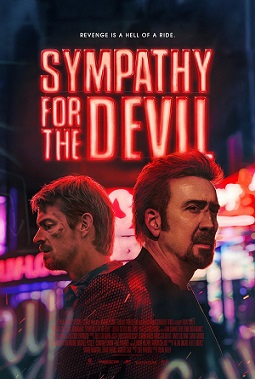
SYMPATHY FOR THE DEVIL
US, 2023, 90 minutes, Colour.
Nicolas Cage, Joel Kinnaman, Alexis Zellicoffer, Burns Burns.
Directed by Yuval Adler.
Not a variation on the Rolling Stones.
This is a Nicolas Cage film, one of those maniacal performances, maniacal in look, maniacal in sound, sometimes controlled, sometimes beyond control.
The film opens like a thriller, Joel Kinnaman taking his wife to the hospital to give birth, Cage intruding and demanding that he drive him to a destination, holding a gun to the driver. What emerges is a story of changed identity, crime in the past, desire for revenge.
Along the way, which is mainly filmed inside the car, there is a stopover when the driver speeds and a policeman pulls him up, a Nicolas Cage tantalising conversation with the policeman and then shooting him. There are car crashes, and dramatic scene and threats in a diner, more menace.
The film seems something like a short story. It has been directed by Yuval Adler, Israeli director of the spy film, The Operative.
- The title? It use? And which character here is devilish?
- Nick Cage fans, his presence, the red hair, menacing, psychotic, over the top, maniacal in sound and look?
- The opening situation, the driver, his family, the child, his pregnant wife, driving to the hospital, sense of urgency, the phone calls with the hospital?
- Trying to park, the shock of the passenger, getting in, menacing, the gun, the driver and his urgency for his wife, no explanations, insistence, menace?
- The drama of the drive, the alleged destination for the mother in hospital, the driver’s uneasiness, nervous, tension? The confidence of the passenger, sneering, mockery? The bulk of the film with the audience identifying, distancing from the characters?
- The conversation, the threats, the gun, speeding, the police, the passenger and his mock interrogation about questions and rights, shooting the policeman?
- The issue of identity, the passenger insinuating the driver’s previous identity, Boston, giving the details about the company, the accountant, the violence, the death of the passenger’s wife?
- The attempted crash, confrontation, shooting, the fights?
- The diner, the waitress, the details of the menu, no substitution, the passenger and his tantrum about cheese? The truck driver, observing, the passenger pulling the gun, the trucker fleeing, shot, the foot on his neck? The mother and child fleeing? The cook, attempting to run, shot, getting out of the diner, the later encounter with the passenger, left to die? The waitress, the discussions about the menu, her hiding and fears, let go?
- The buildup to the truth, admission, psychological warfare, menace? The crashing of the car, the passenger and his injuries, the driver escaping, his foot on the passenger’s neck, death, going to the hospital? His future?
Anatomy of a Fall
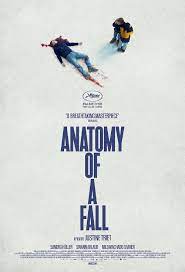
ANATOMY OF A FALL
France, 2023, 151 minutes, Colour.
Sandra Huller, Swann Artaud, Milo Machado Graner, Antoine Reinartz, Samuel Theis, Jehnny Beth, Camille Rutherford, Anne Rotger.
Directed by Justine Triet.
An intriguing film which holds audience attention for 2 ½ hours. It won the Ground Prix at Cannes, 2023 and received five Oscar nominations, including Best Film, Screenplay, Actress.
In 1959, there was a fine American film, Anatomy of a Murder, with James Stewart and George C.Scott. At the core was a murder. But, the film was significant in the anatomy of the murder taking place in police investigations but, especially in the courtroom proceedings.
And, it is the same here, effectively so.
We are tantalised immediately. A journalist comes to interview a noted writer, living with her husband and son in a chalet in the Alps outside Grenoble. They strain to hear each other, as we strain to hear them, because above them, the husband is playing 50 Cent’s music on a loop, loudly, gratingly so, and on and on. Their son takes the dog for a walk. The visitor leaves. And, when the boy arrives back from his walk, he discovers his father dead in the snow outside the chalet.
The possibilities for the husband’s death are threefold. His wife killed him; an intruder killed him; he killed himself. The audience will begin to formulate their own theories, listening to extensive interviews and discussions between the wife and her lawyer, interviews with the boy, elaborate reconstructions of the scene, especially to test whether conversations could be heard over the loud music by the boy outside the chalet. The screenplay offers no easy solutions.
Then a year passes, the court case begins, the wife accused.
The court sequences, many and some quite long, are very well written, the wife present all the time, able to intervene. She is Originally from Germany, meeting her husband in England, using English for communication, passable French, but her being required to give her testimony in French. Her legal team, especially a friend from the past, intervene on her behalf. However, it is the young prosecutor, brimming with self-confidence, those who would not like him dismissing him as smug who commands court and our attention. He is more than incisive, cross-examining the witnesses, minutely probing every word they use, finding incriminating implications, creating them. The witnesses include the initial journalist, an expert with technological demonstration about the nature of the fall blood spattering, the doctor who prescribed medication for the dead man, a technician for recordings that the husband had made in the weeks before his death.
And, throughout the court case, there is the very detailed anatomy of a marriage, the exposure of great detail, intimate detail, conflict, support, resentments, and complications about the son’s accident when he was small.
Ultimately, there is a significant focus on the son, aged 11, and his testimony in the case.
The wife is played by German actress, Sandra Huller, best known for her presence in the very popular German film, Toni Erdmann. She gives an impressive performance here and was also the star of another winner at Cannes, 2023, The Zone of interest.
One of the best of courtroom dramas.
- The status of the film? Awards nominations?
- The title, the reference to Samuel and his literal fall to death? The revelation of his character, his personal fall from confidence to suicide?
- The chalet in the Alps, the beauty of the surroundings, snow, mountains, the interiors of the chalet? The contrast with Grenoble, the court sequences? The countryside, the diners? The musical score?
- The importance of music throughout the film, the loud music at the beginning,.50 Cents (and accusations of misogyny)? Daniel and his piano pieces, playing with his mother, loud music?
- The opening, Sandra, the interview with Zoe, the loud music on audience response to it, interrupting the conversation, the interview being taped, discussions about writing, Sandra asking her visitor questions? Breaking off of the interview? Daniel, with the dog, going for the walk? His return, finding the body of his father, Sandra’s reaction, the doctor, the police?
- Sandra alone with her husband in the house, her version of what happened, talking, the music, translating, the earplugs, sleeping? The plausibility of the suspicions? The possibility of suicide?
- The writing of the film and its development, the audience participating in the interrogations, observing, identifying, distancing, Jury attitudes?
- Vincent, his arrival, sympathetic, lawyer, knowing Sandra from the past, the conversations, the audience listening, her explanation of what happened, its plausibility? Vincent and his comments on what she should say, what she should not say, words and phrases that could be interpreted negatively? Incriminating?
- Daniel, his age, the story of the accident, his father not picking him up, ringing the babysitter, his being hit by the cyclist, destroying his optic nerve, long time in hospital, his father taking the blame, Sandra and her blaming Samuel, the repercussions for Daniel, in the aftermath of the accident, his site, relationship with his parents, the piano, his fondness for the dog?
- The year passing after the opening interrogations? The court case, Sandra in the dock? The layout of the French court, Sandra’s presence, the judges presiding, the two lawyers on each side, the witnesses at the stand in the centre? The jury? The camera sometimes roving over the jury and the crowd?
- Audience response to the detail of the court sequences, attitude towards the prosecutor, his self-assurance, quibbling on words, interpreting words all the time, making them incriminating, suggestions, probing? The response of Vincent, counterbalancing, intervening, his assisting counsel and her interventions? The attitude of the presiding judge, seemingly to favour the prosecutor? Her interventions?
- The revelation of the life of Sandra, Samuel, their marriage, the details, the psychological repercussions, the revelation of such details? Sandra in the court? Listening, her interventions, to speak in French, appealing to speak in English? Her demeanour throughout the trial, giving no indication that she had killed her husband?
- The range of witnesses, Daniel and his presence observing, the previous record of his memories, his inconsistencies, not seeing well, feeling the bits of material to guide his journey throughout the house and outside, the elaborate testing of whether he could hear an argument between husband and wife with the music blaring? His testimony in the court, treatment by the lawyers? The judge summoning him, his appeal that he had already been hurt and therefore he should stay in the court in order to understand? Her granting this?
- The journalist, the playing of the interview, the words, the music, the prosecutor and his insinuations, Sandra bisexual, the discussion of seduction and her manner, definitions of seduction, precision, the prosecutor and his conclusions, smug and self-satisfied?
- The medical experts, for and against Sandra, the fall, the body weight, somebody lifting the body, the fall, the blood spattering, the scientific explanation in diagrams and details? What was possible?
- The situation of Samuel, psychological states, the prescriptions, of the reasons, his wanting to get off the medication, the psychologist and his interpretation, in favour of Samuel, highly critical of Sandra, his conclusions? Sandra and her indication of Samuel’s vomiting, the remnants of the pills? This evidence dismissed because of its being her word? Her confronting of this man, his partial knowledge of the situation?
- The introduction of the tape, the playing of the tape, the flashbacks, the audience seeing and hearing whereas the court and jury hearing only? Audience response to Sandra on the evidence of the flashbacks, her generally being calm, rational, her explanations, Samuel, erratic, his decisions, the aftermath of the accident, forcing them all to go to the chalet, his lecturing, his home tutoring Daniel, yet his wanting time, giving up on his writing, allowing Sandra to use a key idea, her reading his work, encouraging him? The exasperation, his accusations about her affair, the anger, the violence? And this only a day before he died? The interpretation that Sandra would kill him? The interpretation that he was at his wits and, would take his life? The money difficulties? Sandra success with her novels, jealousies and resentments?
- Sandra, exposed to hearing all this detail, her explanations of the relationship with her husband, her interpretation of the recording, credible?
- Daniel, his decision to testify again, the importance of the young woman assigned to guard him, prevent discussions about the case, her relationship with him? His asking her opinion, her refusing? Urging him to decide? Wanting his mother away for the weekend? The dog, the pills, helping the dog, the hot water, vomiting? His memories of the dog vomiting before, that it it had lapped up his father’s vomit?
- In the court, his explanation of the situation, the prosecutor saying it was only his testimony and ideas, but Daniel’s speech, becoming the focus of the case, remembering his father driving him, no music, the dog and the vet, his father preparing him that the dog would die – and Daniel realising that he was speaking about himself and his death?
- The audience learning of the acquittal not in the court, the journalist, speaking to camera, hearing the news, seeing the people coming out of the court, the interviews with Sandra?
- Daniel, his going home, being with his guard? Sandra, the phone call, asking about whether she could come home that night, her joy when he said yes, the dinner with Vincent and the emotions at the end of the dinner?
- Her return home, the embrace with Daniel, and the meaning of her going to lie down, and the dog coming, the dog who provided the situation for her acquittal?
- A satisfying analysis of the situation, in court, out-of-court, the minute detail to be analysed for making a judgement?
All of Us Strangers

ALL OF US STRANGERS
UK, 2023, 105 minutes, Colour.
Andrew Scott, Paul Mescal, Jamie Bell, Claire Foy.
Directed by Andrew Haigh.
With strangers in the title, and referring to everyone, strangers to one another, strangers in our relationships, this is a very melancholy title.
The screenplay, based on a novel by Japanese author, Taichi Yamada, was written by Andrew Haigh who has had a successful career writing and directing screenplays which probe same-sex relationships, Weekend, Looking. He also wrote and directed the insightful film about an aged married couple, 45 Years.
Irish actor, Andrew Scott, has had a substantial career since he was very young, Moriarty to Benedict Cumberbatch as detective in the series, Sherlock, C in the James Bond film, Spectre, and as a comic priest in Phoebe Waller’s comedy series, Fleabag. This is one of his best and most moving performances.
He plays Adam, in his 40s, alone, lonely, a gay man who has had not had an emotional relationship. He is a screenwriter, probing his own history in his writing. Scott makes Adam someone whom we respond to with care, concern about his loneliness, occupying a room in a huge new high-rise apartment block in London, but the other flats still empty. He encounters Harry, Paul Mescal (Normal People, Aftersun, Foe, Gladiator 2) at his door, Harry drinking, suggestive, but Adam closing the door on him.
But we know that Harry will persevere, something will develop between the two.
While watching the film, the key word that emerges in our consciousness is “empathy”. Adam is such a pleasing and sympathetic character who invites our empathetic attitude towards him, for him as a person, for him as a lonely man, for him as a man with a homosexual orientation. And the theme that the film explores is what is “being in love” for Adam.
This is a question is posed to him by his mother. And the appearance of Adam’s father and mother takes us into a different realm in the storytelling. They have been dead for 30 years, sadly killed in a car crash when Adam was 12. But, as he looks at the box of photos from the past, he has an overwhelming desire to visit the house again, takes the train, walks the street, encounters his parents, goes into the house, sits down and talks with them. They are played very effectively (and we remember Billy Elliot and The Crown) by Jamie Bell and Claire Foy.
So happy is Adam in his parents and rediscovering them, that he goes back, encountering his mother alone, she innocently asking about his girlfriend, he telling her about his orientation, her being rather bewildered, not knowing how to talk with her son. In his next visit, he encounters his father has been told by his wife about Adam and mentions that she needs to rearrange a few things in her mind. What follows is a powerful discussion about Adam and his experiences as a young boy, bullied at school, his father realising the orientation and the question between them of why his father never spoke to him about the issues and why he never spoke to his father.
These revisits to his parents have a disturbing effect on Adam, waking disturbed, Harry there as support for him. The line between fantasy and reality is disappearing.
These ghostly themes continue with some farewells, and a very sad ending.
In these years of discussion about same-sex relationships, talk about blessings of same-sex unions, this is an empathetic film for a wide audience.
- The title? Melancholy? Relationships?
- The London setting, the block of flats, high, empty, the interiors, the corridors, the lifts? The musical score?
- Adam’s story? The performance by Andrew Scott, empathy? His age, screenwriting, exploring his past, living alone, lack of relationships? Hearing the alarm, going outside, looking up, seeing Harry? Harry and his visit, the talk, Adam shutting the door? Harry’s later return, his story, father, alienated, his mother? Adam inviting him in, the talk, the touch of tension, Harry relaxed, the drink, discussion about the difference between gay and queer, the physical attraction, the sexual encounter, the aftermath?
- Adam and his writing, seeing the photos of the past, the audience learning that his parents had died in a car crash, black ice, father instantly, mother later, losing an eye? The house, his desire to visit the house?
- Adam and his physical condition, health? The screenplay showing him to visit the house, the encounter with his parents, the return visits, his waking up? The line between reality and dream? Sometimes overlapping? At home and sleeping and waking, Harry reassuring him? Waking up on the train, but this being part of dreams? Seeing Harry in the underground, following him, alone on the train?
- And these scenarios as possibility for his screenwriting, exploring and understanding his past?
- Going home, comfortable, his parents at the age they died, their welcoming him, the characteristics, father being jovial, mother loving her son and being fussy? His happiness in meeting them again? The decision to return, the visit with his mother, her asking about girlfriends, getting him something to eat, his revealing his orientation to her, her not understanding, her being uncomfortable? The visit to his father, his father reassuring him that his mother had told him, that she just had to rearrange some things in her mind, Adam telling his father the things were different, his telling about equality, marriage, less prejudice, but sometimes this rising as it did in the past? His father and his understanding, memories of Adam at school, Adam talking about the bullying, calling him girl, the boys and girls both critical? His father saying he was aware of this? Adam asking why he didn’t come into to talk with him? His father asking why Adam didn’t tell his father?
- The final visit, the outing with his parents, the restaurant and the waitress, the family meal? But his parents not eating, a more ghostly presence, telling him that had to leave, and wanting them to stay, even to visit them once a year? The question about whether the death was instant, his mother not seeing well, but Adam reassuring them they died quickly? And then disappearing?
- Adam returning home, going to Harry’s apartment, finding Harry dead? Harry outside, knowing that his body was in the other room? Adam reassuring him, settling him down, urging him to go to see his mother?
- Reality and fantasy, ghostly presences?
- And Adam, his illness, live in dying, his memories in coming to terms with his life, in love with Harry (and his mother asking him this explicitly,?
- An empathetic film for gay audiences? An empathetic and invitational film for wide audiences?
For a Lost Soldier/ Vor een verloren soldaat
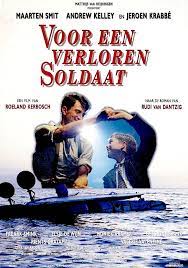
FOR A LOST SOLDIER/ VOR EEN VERLOREN SOLDAAT
Netherlands, 1992, 92 minutes, Colour.
Marteen Smit, Andrew Kelley, Jeroen Krabbe.
Directed by Roeland Kerbosch.
This film is a memoir of World War II, the German occupation of Holland, the transporting of children from Amsterdam to foster care in the countryside. It opens in 1944, establishes the group of children, their being transported, the adoptive families and welcoming them into their households. The action then moves to 1945, the retreat of the Germans, the arrival of the Americans, liberation. It is the story of Rudi van Dantsig, who wrote his story as a novel, contributed to the screenplay. And it incorporates some of the experiences of the director. Rudi van Dantsig was 11 and 12 at this time, the director was four.
The key theme that put this film into the spotlight was the relationship between an occupying American soldier and the 12-year-old boy. The IMDb describes the film as “touching”. Reviews of the time praise the film for its sensitivity. In fact, it is helpful to look at the variety of comments from the bloggers on the IMDb, most of the comments coming eight years and more after the release of the film. There is praise again of its observation of the situation, the emotions of the characters, especially the boy, praise for the lack of explicit moral judgements about the relationship.
Reviews by critics at the time praise the film.
It has been remarked that the film could not be made like this now.
The chief reason for this is the change of public awareness from the early 1990s to the present, more open discussion about paedophilia, the criminal aspects of paedophilia, legislation about age of consent, prosecution of adults who engage in sexual relationships with underage children, the issue of ability for adult consent by underage children, jail sentences. There has been a strong shift in public awareness and public opinion since the 1990s.
Bypassing, for the moment, the central issue, the film is an interesting and strong presentation of occupied Holland, citizens in Amsterdam and the lack of food, the movement (as in Britain and other countries) of children to the countryside, welcoming families, healthy activity and food, school and church. Church is important in this film, the local pastor, the local teacher, church attendance, reading the Bible. There is work to be done, the city children wanting to escape at first, but becoming involved, the central character here, Jeroen helping with the birth of a calf. On the whole, life in occupied Holland seems quite proper – but suggestions of broader issues with one of the refugees, 15-year-old Jan, with some 15-year-old preoccupations with sex.
With the coming of the Americans, and the sense of liberation, the locals respond to the American presence, a concert with a ventriloquist, a singing group, two of the Americans in drag, then the dancing, jitterbugs, and, before long, the roving eye of the Americans and the response of some of the local girls.
But at the centre of the film is Jeroen, played by Marteen Smit in his sole film performance. He has something of a commanding screen presence simply by being there. The film prepares the audience for the sexual issues by a range of sequences, Jan and Jeroen finding a crashed plane in the waters, stripping off to swim out, some sunbaking, gentle references, at home Jeroen having a bath and getting out of the bath… And, there is the suggestion of Jeroen’s curious attraction to Jan and observing him.
The key American is Walt Cook, played by Andrew Kelley in his only film, who takes a shine immediately to Jeroen, spending time with him, giving him sweets, driving around, going to the wreck, letting him drive the Jeep, talking with, increasing intimacy, the audience sensing the emotional and physical attraction, the gay sensibility, and Walt’s story about his growing up, distance from family, and leaving America, the comfortable response by Jeroen and his wanting to be with Walt. This is grooming.
There is a strong scene of intimacy, in Walt’s room, the two naked, on Walt’s bed, and, something that reviewers and bloggers do not mention, the pained look on Jeroen’s face, some tears, during the penetration sequence. However, Jeroen seems to overcome the pain and becomes ever more devoted to Walt.
As said, public sensibilities watching this film in the early 1990s, were not concentrating on issues of underage sexual relationships (or if this was considered, it was considered emotionally favourably). And, as has been said, in recent years, Walt would have been charged with sexual assault of a minor.
Walt disappears, there are happy memories of a photo, and Jeroen’s mother comes to take him away, and a reminder have how welcoming the foster family, parents and children, was.
But there is a framework to the whole film, Jeroen decades later, a choreographer, rehearsing his troupe, dissatisfied with them, talking about themes of freedom and expression. When this is introduced, Jeroen has memories of the past, meetings his younger self momentarily, then the bulk of the film the flashback story. There is a final meeting between the older and younger, then Jeroen the choreographer having some success with his troupe, and, his assistant finding the photo as well is a photo of Walt’s identity tags. Jeroen has no regrets about the past, only the disappearance of Walt.
A comparison might be made with the 1991 American telemovie, Bump in that Night, with Christopher Reeve playing an English professor who befriends a little boy, enjoying his company – the screenplay helping audiences understand paedophile emotions and attractions.
For a Lost Soldier is readily available on YouTube. As is Bump in the Night.
Mulligans
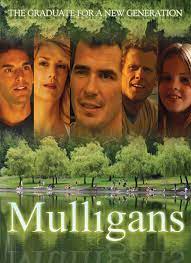
MULLIGANS
Canada, 2008, 92 minutes, Colour.
Dan Payne, Thea Gill, Charlie David, Derek James, Grace Vukovich..
Directed by Chip Hale.
Mulligan sounds like the name of a family. However, it is a golf term, the player getting a second try, a second attempt. This is explained early in the film – which does have a lot of golf throughout.
The film came out in 2008, from Canada, and it is interesting to look at Mulligans in the context of the time, films featuring gay characters, movements around the world, same-sex unions and, especially, political and social implications of same-sex marriages.
It is summer on a lake. The son of the family brings a good friend home from college. The friend is Chase, played by the writer of the film, Charlie David. He tires of his friend trying to set him up with girls, the party life, and finally comes out to his friend as gay.
The core of the film is not so much about Chase as a gay character, this being taken for granted, his behaviour, attitudes, way of communicating. Rather, it is the reaction of the various members of the family. The friend is taken aback and takes a long time to come to terms with the reality. The mother is wary, protective about sexuality, especially with her eight-year-old precocious daughter who seems to get a fixation on one of her teachers.
But the main character is the father. He and his sweetheart married very young, at a time when gay orientation was not acknowledged. He becomes very friendly with Chase and, while his wife and daughter are away, they have a sexual encounter. With the ensuing complexities, both wife and daughter glimpse the couple and their interactions in the woods.
Ultimately, the issues are out in the open, and the father has to make a decision about his life and his marriage.
- The title, the initial explanation, golf, a second try? The importance of golf throughout the film, for and against, successful and diameter, working on the golf links? Topic of discussion, being forbidden? Metaphor?
- Canadian production, cast? British Columbia locations, the home, summer atmosphere, golf course, the woods? The musical score?
- The situation, Tyler at college, his friends, Chase, the artist, travelling to Tyler’s parents? The summer situation, the family, Chase and sharing with Tyler, meals together, conversation, the welcome from Nathan, from Stacy, Birdie and her being outspoken?
- On the golf course, Nathan and his love for golf, conversation, Tyler and his skills, Chase trying out, awkward? Stacy and her being tired of golf talk? Two men working on the golf course and renewal, the course, fences…?
- Tyler and his partying, his girlfriend, Chase of the party, uncomfortable, talking, meeting Jarrod?
- C will hase is gay, coming out to Tyler, Tyler and his disbelief, unable to handle the situation, cautious of intimacy, issues of language?
- Stacy, with Birdie, the issue of the swimming pool and the little boy’s conversation, taking Birdie away, tennis, the coach, Bertie wanting her ears pierced, holding the coach up as an ideal? Stacy, exasperation, the decision to play golf? On the course, seeing Nathan and Chased together? Birdie later indicating she had seen the kiss?
- The family going to the grandmothers, cutting short the experience, coming home?
- Nathan and chased together for the weekend, the attraction, the intimacy, the talk, Nathan and Stacy and the teenage pregnancy, marrying, the 1980s? His not coming out? Suppressing his orientation? The sexual encounter with Chase, the swim? The sudden return home?
- The effect on Chase, talking with Jarrod, moving out, staying with him?
- The effect on Nathan, the tension with Stacie, birdie and her observations, the discussions, civilised, Stacy and her disbelief, but thinking about the past, talking things over with Nathan, his decision to move out? The agreements?
- Tyler, confused, angry, walking out? Jarrod persuading him to go to the bus stop, the farewell?
- A film of 2008, gay themes in films of the 21st-century, more open and frank, issues of repression, homophobia, honesty and resolutions?